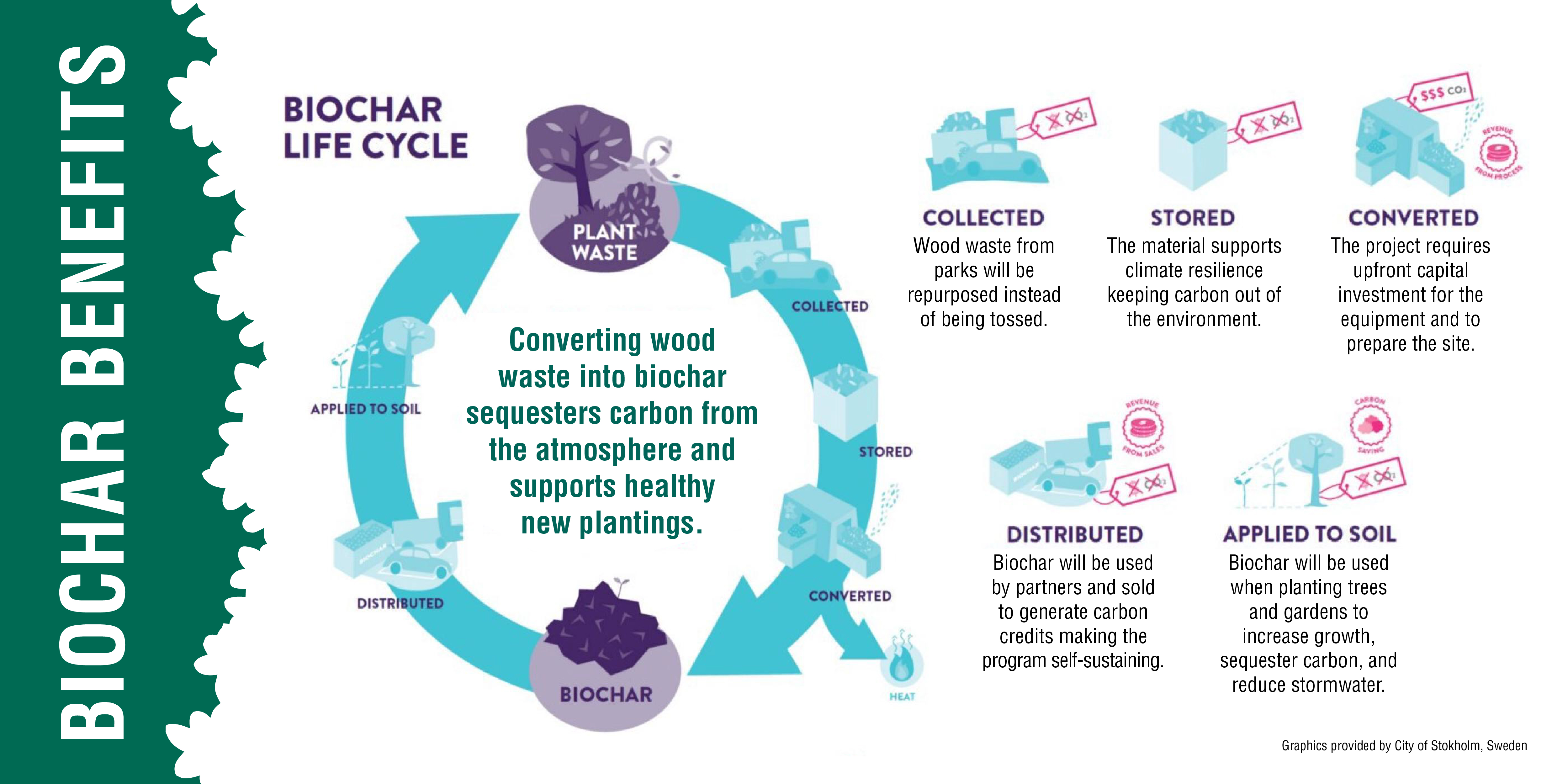Cincinnati Partnership Ramps up to Produce Biochar, A Cutting-Edge New Tool to Bolster Climate Resilience
- Dec 20, 2022

Cincinnati aims to lead the country in the battle against climate change by becoming one of the first US Cities to produce biochar, an exciting technology for removing carbon from the atmosphere and improving the environment. Last week, the Cincinnati Board of Park Commissioners and Great Parks came together to provide additional funding to leverage a generous grant from Bloomberg Philanthropies awarded earlier this year.
Once up and running, wood debris from tree maintenance operations will be repurposed and cooked without oxygen (pyrolysis), to become a special carbon capturing charcoal. The material will then be used as a soil additive to support the health of new plantings while also storing carbon to enhance climate resiliency. The project will be managed by Cincinnati Parks and consultants Carbon Harvest LLC, and includes partners Great Parks, Bloomberg Philanthropies, the City of Cincinnati’s Office of Environmental Sustainability, and the University of Cincinnati.
Cincinnati Parks Director Jason Barron said, “We’re thrilled to partner with Great Parks, who stepped up big, and all of our partners, because together we understand what an amazing opportunity, we have to lead on climate resiliency in Cincinnati. Why would we continue dumping tons of wood waste into the forest to decompose when we have a chance to capture all that carbon and create a new super material allowing trees and plants to grow faster? On both ends, we’re making a difference.”
Cincinnati’s biochar material will be used in new tree plantings to increase survivability and canopy growth within Cincinnati communities, especially those most at risk from climate change. In the soil, biochar improves drought tolerance, promotes soil health, limits runoff, immobilizes contaminants, and reduces methane, CO2 emissions, and odors in compost. Once up and running, Cincinnati will repurpose thousands of tons wood waste into biochar a year, which will keep tons of CO2 out of the local environment.
Great Parks CEO, Todd Palmeter adds “This partnership creates an opportunity for our community to lead the way in conservation, not only by reducing our carbon footprint, but also by providing a more sustainable solution to upcycle the substantial amount of natural waste generated within our parks and conservation areas. The seeds of change are truly in our hands, and this partnership will collectively move the conservation needle as we work together to leverage one another’s strength for the betterment of Hamilton County.”
With last week’s vote, the Cincinnati Board of Park Commissioners and Great Parks joined efforts in approving $300,000 each to support the program. This is in addition to a $400,000 grant received this summer from Bloomberg Philanthropies and $100,000 previously committed by the Board of Park Commissioners. Over time, the $1.1 million project will become financially self-sustaining, utilizing biochar and carbon credit sales to supply the private market and pay for operating expenses and long-term replacement of the specialized equipment.
Cincinnati Parks recently selected Carbon Harvest LLC to help plan the biochar production facility, operate the biochar production, and co-manage the project. The partnership with Great Parks of Hamilton County will add critical composting components to make the biochar shovel-ready for use in soil and sales to the public.
More About Biochar
Biochar is carbon-negative and highly accessible, creating a valuable and useful end product. Trees collect and store carbon during their lives and when they die, that carbon is released back into the atmosphere when the tree decomposes. Instead of releasing all that carbon, this technology captures and transforms the woody material into biochar – a stable form of carbon with amazing ecological benefits. Through pyrolysis, specialized equipment slowly cooks wood chips at high temperatures, without using oxygen, leaving a raw carbon structure resembling charcoal. Once altered, biochar is composed of upwards of 75% carbon that resists decomposition. Biochar then safely stores the carbon for an average of 500 years, effectively removing it from the atmosphere.
To be used in plantings, the raw biochar is mixed with compost to “charge” the carbon structure with nutrients. When charged and added to soil when planting, all necessary nutrients and water are made available improving the resiliency of young trees, and reducing methane and CO2 in the atmosphere.
The Cincinnati project is based on the success the city of Stockholm, Sweden had after winning the Bloomberg Philanthropies 2014 European Mayors Challenge to develop their biochar program. Since opening its first of five planned biochar facilities in 2017, the city of Stockholm has produced over 100 tons of biochar and distributed it to 300,000 citizens removing the equivalent of 700 cars off streets. In addition to start-up funding from Bloomberg Philanthropies, Cincinnati will benefit from robust best practice sharing and peer-to-peer networking.
